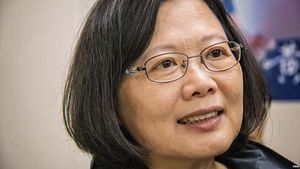In the few days since Tsai Ing-wen’s historic election as Taiwan’s new president (and first female president), much has been written on the consequences for cross-strait relations and the island’s foreign policy. I won’t bother reiterating those points here, but there is an unmistakable takeaway from the results of January 16 that bears emphasizing: more so now than ever, the processes and outcomes of ‘Taiwanization’ have been legitimized. For both China and the United States, this development, more so than any other in the country’s domestic politics, will be of critical importance going forward.
‘Taiwanization’ broadly refers to an unmistakable trend in the island’s identity politics that has existed for decades, but has accelerated since Taiwan’s transition to democracy in the 1990s. Notably, the term came into use following the third Taiwan strait crisis in 1996, when China conducted missile tests to warn Taiwan against the prospect of election Lee Teng-hui, who was seen as a ‘Taiwanization’ proponent. Since then, Taiwanese–and not just the youth–increasingly see themselves as Taiwanese first, Chinese second. Last year, the percentage of Taiwanese identifying as such reached historic highs. The way this identity dynamic has manifested in the country’s politics is interesting and divided along partisan lines.
In 2000, when, for the first time in history after Taiwan’s transition to democracy, the DPP took the presidency from the KMT under Chen Shui-bian, the party emphasized the importance of “Taiwan spirits”–tapping into the uniqueness of the Taiwanese experience and identity. Later, in 2008, when Ma Ying-jeou and the KMT returned to the scene, the rhetoric changed. In fact, one of the first moves by Ma’s government was to remove the use of the word “Taiwan” on the presidential office’s website and replace it with “Republic of China.” It similarly opted to use a picture of the ROC flag for its logo instead of the DPP’s preferred logo showcasing the island of Taiwan in green. (“Taiwan” refers to the island while the ROC comprises all of mainland China.)
These symbolic matters may seem insignificant amidst the broader range of issues that thrust the DPP back into political popularity, including the KMT government’s management of cross-strait relations and the economy, but understanding them is key to imagining the future of Taiwan’s direction. Saturday’s results suggest that the forces behind ‘Taiwanization’ may have reached a point where they will guide the island’s domestic politics for the long-haul.
Consider that Tsai and the Democratic Progress Party (DPP) won by a comfortable margin. For the first time in Taiwanese history, the KMT lost its majority in the Legislative Yuan, somewhat symbolically hearkening to the Sunflower’s occupation of that same building during the 2014 protests. Second, though there are several causes for Tsai and the DPP’s remarkable electoral success, one crucial factor was their popularity with Taiwan’s youth. Over half of Taiwanese between the ages of 20 and 29 favored the DPP to the KMT. (Beijing’s turned its attention to courting Taiwanese youth, emphasizing a common Chinese cultural identity.)
Last year, I spoke with J. Michael Cole, who covered the Sunflower Movement extensively in Taiwan for The Diplomat, on the podcast. Cole recounted the explosion of civic nationalism in Taiwan, linked both to dissatisfaction with the management of the relationship across the strait and with a sense that the KMT government’s acknowledgment of these grievances was perfunctory at best and non-existent at worst.
Even beyond the DPP’s success, we see the emergence of new political forces in Taiwan borne precisely of this civic nationalism, notably the New Power Party. Founded in early 2015, the NPP comprises many of the young leaders who led the Sunflowers in 2014 against the Cross-Strait Service Trade Agreement (CSSTA). After Saturday, the NPP will sit in the Legislative Yuan as the country’s third-largest party. Imagining NPP candidates like Huang Kuo-chang, the party’s chairman, Freddy Lim, and Hung Tzu-yung beating KMT veterans may have been imaginable just over two years ago, but is today a reality.
For U.S. policymakers who worry about changes to the uncomfortable but pragmatic status quo in the Taiwan strait and observers in Beijing who fret about the future of the almost-poetically ambiguous 1992 consensus, these shifting dynamics in Taiwan are unwelcome. Tsai herself has said she won’t rock the status quo boat. But eventually, this may prove untenable given the realities of domestic politics in Taiwan.
Even beyond the dichotomous outcomes of unification and independence, Washington and Beijing will have to take stock of this unmistakable trend toward Taiwanese asserting a unique political identity. Economic pragmatism and existing reliance on ties with China will moderate overnight shifts in Taiwan, but a gradual shift is underway.
However, the proliferation of a uniquely Taiwanese identity is not ubiquitous on the island. The KMT and the Pan-Blue Coalition have sought to portray past DPP attempts at formal Taiwanization as a disenfranchisement of those Taiwanese who feel an affinity to a pan-Chinese identity. The matter is far from settled, but as a new generation of Taiwanese take interest in the island’s politics, the tables are turning. Even within the KMT, the issue is divisive enough that it may change the party going forward.
Additionally, it’s worth emphasizing that these shifts in Taiwanese identity politics don’t suggest the emergence of widespread “anti-China” sentiment, a common and all-too-unfortunate characterization of the DPP and the NPP. “Pro-Taiwan” is the better descriptor. Unfortunately, for Beijing, the logical outcome of too much “pro-Taiwan” sentiment is seen as de jure independence–if not with Tsai, then another leader, another day.
For the United States, understanding how to reconcile its status quo support for Taiwan under a policy of strategic ambiguity while acknowledging the Taiwanese people’s genuine democratic aspirations to assert a uniquely Taiwanese identity will be critical. Events on the island leading up to Saturday’s election have taken Taiwanese identity politics to a point of no return. It would be foolish for Washington to push on as if nothing had changed.

































